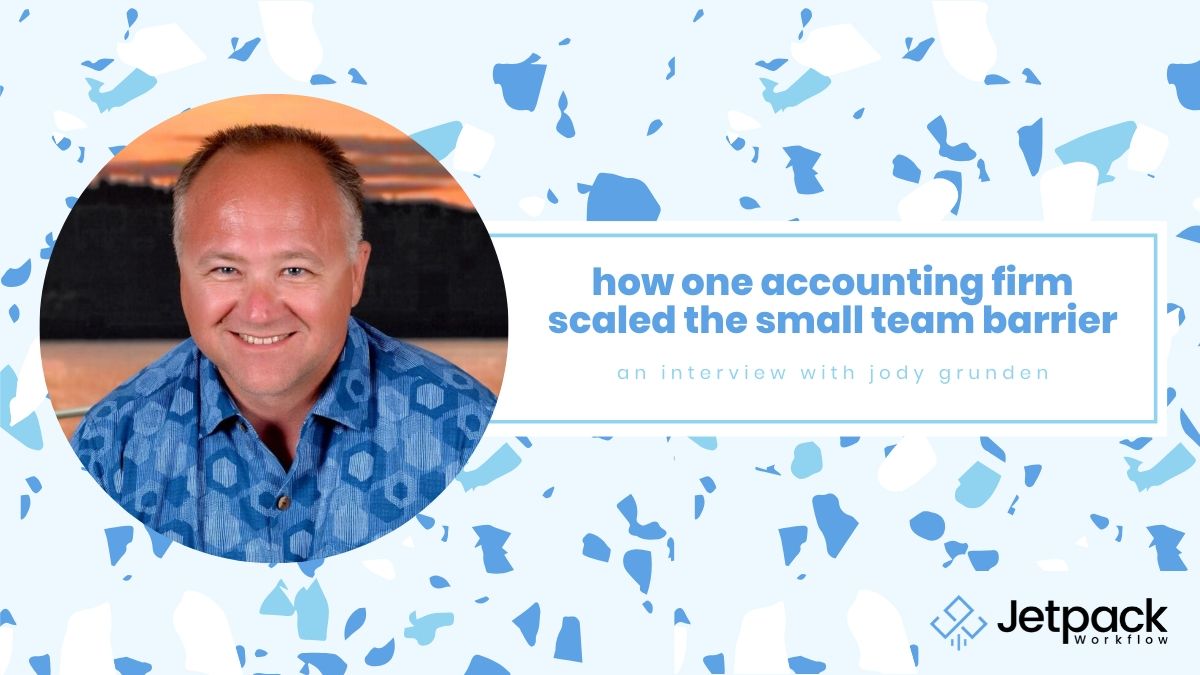How One Accounting Firm Scaled The Small Team Barrier

Scaling is one problem that many financial firms face when they get a little success under their belts. When you reach certain thresholds, the old ways of running your business will show their brittleness. What may have worked for a team of 6-12 might not work as you add more clients.
How do you prepare for successful growth? We’ll be talking about a way to do that in this episode of the Growing Your Firm podcast. Jody Grunden is our guest. He is the co-founder and CEO of Summit CPA Group and a member of the Forbes Finance Council. He’s also the author of “Digital Dollars and Cents: A Virtual CFO’s Playbook to help Digital Companies Create a Financial Roadmap to Success”
We’ll look at how he grew Summit CPA Group and how he used the lessons from that to take dozens of other financial services businesses to the next level.
Summary:
- How Summit CPA got started and how it blew up.
- Deciding how to find the best candidates through rigorous testing
- When you need to hire a director
- And much more that’s all in the podcast!
Additional Links:
- Jody can be reached at jody@summitCPA.net
- Summit CPA Group can be reached at https://www.summitCPA.net
How Summit CPA Started Growing
My business partner and I started like many new companies do. We were just out of college and only had a handful of clients from our friends and family. We did make $100,000 that first year, which was great. But then I decided I didn’t want to bill hourly anymore. We went flat-fee and that almost killed the business. Luckily, we found a way to move to consulting and billing based on the value we gave our clients on a monthly basis.
We dug into forecasting and non-financial KPIs, things our clients could use for future planning, not just traditional financial statements. During the monthly meetings, we’d ask what changes they were expecting over the next month, plow that back into our forecasting model, and come up with predicted changes in net income and on the balance sheet.
Our clients loved this and we decided to add another tier of service where we’d meet weekly. The clients loved us even more. But we started to hit scaling problems. My partner, Adam, and I were doing all the work and we didn’t really want to bring new people out to our clients and sit in at the meetings. So we tried doing it through phone and over the internet. Back in 2007, video conferencing was really horrible, but it’s what we had and the clients loved it.
Now we have about 75 digital marketing companies, our main vertical, and a smattering of clients in other industries from our earlier days. Until about 2011, we only had about 18 clients, and then we picked up 11 more in one month thanks to narrowing our niche and word of mouth. It was exciting, but the scaling problems were tough.
Here’s how we were able to do it.
Buried By Resumes
Considering we were doing something that was new at the time, virtual CFO services, we needed to find people who had our skillsets. We did an interview with FlexJobs to see if they could help us. They took the interview about what we did and they made an article out of it. That article got picked up by Forbes without our knowing and my email blew up with resumes in the middle of a client call. I was getting a resume about once every three seconds. I thought it was a spam attack at first.
So, we got lucky by getting great press out (accidentally) on an entirely new way of doing CFO services. But then we had another problem. How do we pick the best of the bunch? This is much easier these days, but back then we didn’t have to tools to filter resumes like we do today.
We quickly discovered that most of the people sending resumes were highly qualified on the accounting side, so we had to focus on who had the best soft skills to work with our clients. The best people for our business were those who had a high score on the Emotional Quotient Inventory (EQI). We needed people who could interact with the clients, find out their needs, smooth over problems, and basically read other people well. We estimate that about 50-60% of our job comes down to using skills that are measured by EQI.
Find Candidates That Fit Your Values
You can’t really ask someone how emotionally aware they are. It takes skillful questions and careful observation after hire.
At Summit CPA, we have six core values that we look for in candidates to see if they’ll fit our company culture.
- The first is humor, which may sound strange for an accounting firm. But people with a good sense of humor are able to adapt to changes much better. A lot of CPAs have a problem when things change too much. And we like to have fun too.
- The second is delegation. We try to avoid people who like to do everything themselves and become linchpins. We want our hires to teach and empower others so we can all work at our best, which is vital when you have rapid growth.
- The third is candor. CPAs have to be blunt with people sometimes. We look to see how they tell clients to start things, stop things, continue with things, that sort of thing.
- The fourth is curiosity. We want people who can crunch numbers, but we also want people who can question processes and ask why we do things a certain way.
- The last two are grit and resilience. It took a lot of time to develop a way to filter for these qualities. Now we put candidates through six or seven interviews, have them take the EQI test, and look for these factors by putting them through scenarios. And then we have a 90-day probationary period where they get extra training and reviews every two weeks.
And it doesn’t stop after the probationary period. We do employee reviews every six months and we also talk with our clients about their experience with us to see where we could do better.
The bottom line is that if you have skilled people pounding your inbox, switch your interview focus to those soft skills that aren’t so easy to measure.
Hire Directors When Necessary
Another way that we improved our scalability is through our organizational structure. This was another thing we learned the hard way. We wanted to increase revenue during the slow season so I looked into doing 401k audits. But after we got a few clients, I realized I wanted nothing to do with it.
That’s how we brought in our first director, Kim. She’s amazing at it, and I don’t have to worry about doing it. And then the same thing happened with our tax division. Dave took over that responsibility. Now Adam and I hardly do any tax returns.
This delegation isn’t just important for us, but also for the teams as well. Each one of our virtual CFOs is only responsible for a certain number of clients and they’re only responsible for the tax returns of those clients. We don’t have a lot of one-offs. Each person is responsible for maybe 20 tax returns each year. This makes our clients happy because their taxes are done faster, but it’s a huge boon to our employees. They don’t have to work huge amounts of overtime during the tax season.
My recommendation for when you need to hire a director is when you reach a point where you want to grow but cannot do it anymore. We wanted to grow, but we didn’t want to do audits ourselves because it was such a time-intensive process. So we hired the best person we could find. And it wasn’t all external either. We took one of our employees, Jake, off of CFO services and onto our technology team because he was so good at it. We gradually transferred his clients to others so he could focus full-time on technology.
Find the things that you aren’t good at or don’t want to do or that are holding you back, then look for people that can do that for you. Trust them and empower them to take advantage of your funnel instead of routing everything through you. As a CEO, most of my emails are from vendors and speaking engagements, not clients, because my directors have the power to take care of things.
Further Insights
These are the things that worked for me, but they may not work for you. However, I can recommend the books that shaped my thinking in this direction. If you’re wanting to craft a new structure for your business because you can’t grow anymore, I recommend the following:
- The Myth by Michael Gerber
- Grit by Angela Ducksworth
- Radical Candor by Kim Scott
- Emotional Intelligence by Daniel Goleman
- The Richest Man In Babylon by Charles Conrad
My email is up in the additional links section. Feel free to reach out to me if you have more questions about scaling your business.
RELATED LINKS:





